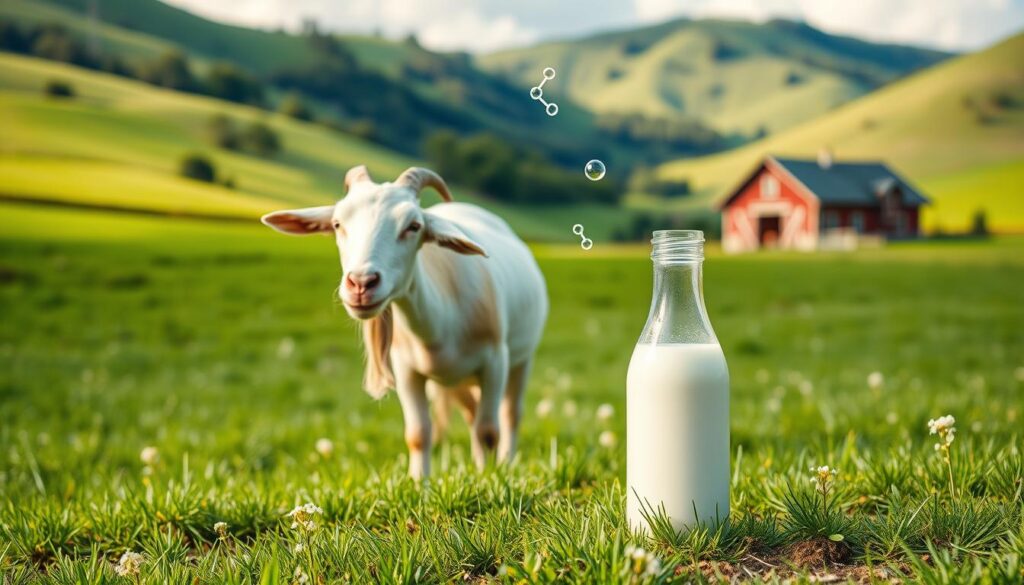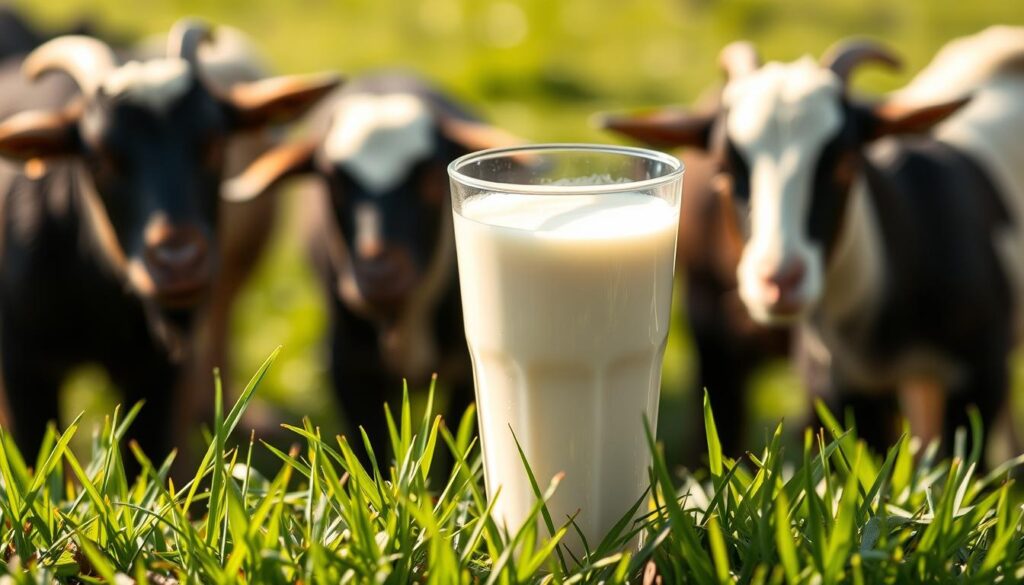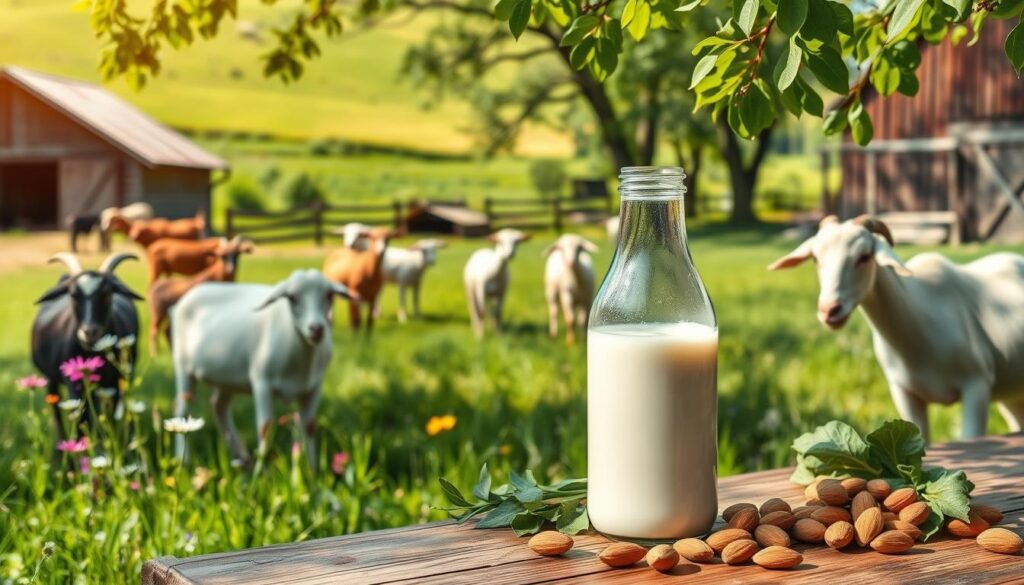Does Goat Milk Have Lactose?
We’ve dealt with lactose intolerance for years, making it hard to find dairy that doesn’t upset my stomach. The question of whether goat milk has lactose is key for me and many others. Dairy has been a big part of our diet for thousands of years. But with lactose intolerance becoming more common, it’s vital to know about different milks.
Goat milk is packed with nutrients and has been eaten by humans for ages. Yet, with 75% of the world’s population lactose intolerant, it’s important to check if goat milk has lactose. It’s a good dairy option for some. Goat milk has about 4.20% lactose, less than cow’s milk’s almost 5%.
Even though goat milk has lactose, people with mild intolerance might find it easier to digest than cow milk. This is because goat milk has smaller fat globules. These make it simpler to digest.
Introduction to Goat Milk
Goat milk has been a staple for centuries in many parts of the world. Its popularity is growing globally. More people drink goat milk and eat goat milk products than cow milk ones.
This is because goats are easier to keep than cows, which is helpful in developing countries. Goat milk is a key source of calories, protein, and fats there.
Goat Milk’s Popularity Around the World
In many countries, goat milk is preferred over cow milk. Goat milk is thicker and creamier. It also has more nutrients than cow milk and plant-based “milk” products.
Nutritional Profile of Goat Milk vs. Cow Milk
Goat milk is higher in protein, fat, vitamins, and minerals than cow milk. In 2018–2019, there were about 1.003 billion goats worldwide. Around 203 million were dairy goats, producing 15.26 million tons of milk each year.
Asia is the biggest producer of goat milk, with India, Pakistan, and Bangladesh leading the way. Goat milk is more digestible and has better buffering and alkalinity than cow’s milk. Its proteins have a different ratio, affecting its functions.
Methods like ultrafiltration and acid precipitation can extract high-quality protein isolates from goat milk.
Lactose in Goat Milk
Lactose is a key carbohydrate in all mammal’s milk, including goat milk. Goat milk has less lactose than cow milk. Cow milk has almost 5% lactose, while goat milk has about 4.20%.
Understanding Lactose Intolerance
Lactose intolerance happens when you don’t have enough lactase enzyme. This enzyme is needed to digest lactose. Eating foods with lactose can cause bloating, gas, diarrhea, and stomach pain for those with intolerance.

Lactose Content in Goat Milk
Goat milk has less lactose than cow milk, making it easier to digest for some. Studies show that about 75% of the world’s population can’t digest lactose. But, goat milk might not be okay for those with very bad lactose intolerance.
Goat milk is not lactose-free, even though it has less than cow milk. People with severe intolerance should avoid it. Those with mild intolerance might be able to eat some goat milk without too much trouble.
In short, goat milk has lactose, but less than cow milk. Knowing how much lactose you can handle is key when eating goat milk and its products.
Does goat milk have lactose
Many think goat milk is lactose-free, but it’s not. Goat milk actually has lactose, a natural sugar found in all mammal milks. It has less lactose than cow milk, which can be good for those with lactose intolerance.
Studies show goat milk has about 4.20% lactose, while cow milk has almost 5%. This means some people with mild lactose intolerance might find goat milk easier to digest. The lower lactose in goat milk can help with digestion for those sensitive to lactose.

Lactose intolerance affects about 65% of the population. While goat milk might be better for some, it’s not lactose-free. People with severe intolerance may not find relief with goat milk.
| Dairy Product | Lactose Content |
|---|---|
| Cow Milk | 4.7g per 100ml |
| Goat Milk | 4.2g per 100ml |
| Aged Cheese (6+ months) | Very little lactose |
| Full-fat Yogurt | 8.5g per serving |
| Nonfat Yogurt | 14g per serving |
| Butter | Trace amounts |
In short, goat milk does have lactose, but less than cow milk. This makes it a better choice for those with mild lactose intolerance. Yet, it’s key to remember that goat milk is not lactose-free and can upset those with severe sensitivity.
Benefits of Goat Milk for Lactose Intolerance
Goat milk can be a big help for those with lactose intolerance. It has less lactose than cow milk, which might make it easier to digest. Studies show that people with lactose intolerance can usually handle a cup of milk a day. For some, goat milk in moderation might be a good choice.
Easier Digestion of Goat Milk

Goat milk is easier to digest for those with lactose intolerance. It has smaller fat globules. This helps break down lactose better, making it kinder to your stomach. This is great for those with mild lactose intolerance, letting them enjoy dairy without discomfort.
Moderate Consumption for Mild Intolerance
If you have mild lactose intolerance, you can try goat milk in moderation. Adding it to your diet along with other lactose-free products can help. This way, you can enjoy the benefits of goat milk for lactose intolerance, like better digestion and tolerance.
Nutritional Advantages of Goat Milk
Goat milk is a standout in the world of dairy. It has more protein per serving than cow milk, soy milk, or nut milks. An 8-ounce serving of whole goat milk has 8 grams of protein. This makes it a great source of protein.
Goat milk is also packed with calcium, potassium, phosphorus, magnesium, and vitamin A. These nutrients are key for healthy bones, a strong immune system, and energy.
Potential for Reduced Milk Allergies
Goat milk might be easier on the stomach for some people. Research shows that many with cow milk allergies can tolerate goat milk. This is because goat milk’s protein is slightly different from cow milk’s.
| Nutrient | Goat Milk | Cow Milk | Soy Milk | Almond Milk |
|---|---|---|---|---|
| Protein (g/cup) | 8 | 8 | 4 | 1 |
| Calcium (mg/cup) | 330 | 300 | 451 | 452 |
| Vitamin A (IU/cup) | 500 | 500 | 0 | 0 |
| Saturated Fat (g/cup) | 10 | 7.9 | 0.5 | 2.5 |
Goat milk’s nutritional benefits and its ability to help with milk allergies make it a great choice. It’s a dairy alternative that offers more than others.
Goat Milk and Cholesterol Management
Goat milk might be a surprise help for managing cholesterol. Studies found it can lower cholesterol in people with high levels. It does this by reducing cholesterol in arteries and the gallbladder.
A 1-cup serving of raw goat’s milk has 168 calories, 6.5 grams of saturated fat, and 27 milligrams of cholesterol. Cow’s milk has similar calories, saturated fat, and cholesterol to regular dairy milk. This makes goat milk a good choice for those watching their cholesterol.
| Milk Type | Calories | Saturated Fat (g) | Cholesterol (mg) |
|---|---|---|---|
| Goat Milk | 168 | 6.5 | 27 |
| Cow Milk | 149 | 7.9 | 24 |
| Soy Milk | 80 | 2 | 0 |
| Almond Milk | 30-40 | 0 | 0 |
| Oat Milk | 80 | 0 | 0 |
| Hemp Milk | 80 | 0.5 | 0 |
| Coconut Milk | 45 | 4 | 0 |
| Rice Milk | 113 | 0 | 0 |

Even though goat milk cholesterol levels are a bit higher than cow’s milk, research suggests it can lower overall cholesterol. This makes goat milk a good option for managing cholesterol through diet. Always talk to a healthcare professional before making any big changes to your diet.
Drawbacks of Goat Milk
Goat milk might be better for those with mild lactose intolerance. But, it’s not without its downsides. It’s not completely lactose-free and has more calories than cow milk or plant-based milks.
Not Lactose-Free
Goat milk, like cow milk, has lactose, a natural sugar. It has less lactose than cow milk, but it’s not good for those with severe lactose intolerance. People with severe intolerance should choose lactose-free or plant-based milks instead.
Higher Calorie Content
Goat milk has more calories than cow milk or many plant-based milks. A cup of whole goat milk has about 168 calories. Whole cow milk has around 149 calories. This is something to think about if you’re watching your weight or calorie intake.
Goat milk has some benefits, but it also has drawbacks. People with severe lactose intolerance should avoid it. Those watching their calories need to consider goat milk’s higher calorie count. Knowing about goat milk’s pros and cons helps you make better choices about dairy.

| Characteristic | Goat Milk | Cow Milk |
|---|---|---|
| Lactose Content | Slightly Lower | Higher |
| Calorie Content (per cup) | 168 calories | 149 calories |
| Suitability for Lactose Intolerance | May be easier to digest for mild intolerance | Not suitable for severe lactose intolerance |
Alternatives to Goat Milk
If you have a dairy allergy or severe lactose intolerance, goat milk might not work for you. Look into lactose-free plant-based milks instead. Soy, almond, and hemp milk are great alternatives that don’t have lactose or common allergens.
Dairy milk is a big deal in 96% of American homes. But, it can be tough for those with lactose sensitivities. Luckily, lactose-free milk is easy to find and costs about $0.50 per 8-ounce serving. That’s cheaper than goat milk’s $1.20 per 8-ounce glass.
Goat milk is known for its nutritional benefits, like more protein and calcium than cow milk. Yet, it does have some lactose. If you have mild lactose intolerance, goat milk might be okay in small amounts. But, those with severe reactions should choose lactose-free options instead.
| Milk Type | Cost per 8 oz | Protein per Dollar | Lactose Content |
|---|---|---|---|
| Cow Milk | $0.25 | 32 grams | Moderate |
| Goat Milk | $1.20 | 7 grams | Slightly Lower |
| Lactose-Free Milk | $0.50 | 16 grams | None |
For those looking for dairy-free and lactose-free options, soy, almond, and hemp milks are excellent choices. These plant-based milks can be used in many recipes. They’re perfect for those with specific dietary needs or preferences.
Conclusion
Goat milk does contain lactose, but less than cow milk. People with severe lactose intolerance should avoid it. Yet, those with mild intolerance might be able to have it in small amounts without big problems.
Goat milk is rich in protein, vitamins, and minerals. But, it’s not lactose-free and has more calories. For those with strict diets or weight concerns, plant-based milks might be better.
Goat milk can work for some with mild lactose issues. But, it’s not for everyone. Always talk to a doctor before changing your diet. They can help find the best milk for your health and taste.




